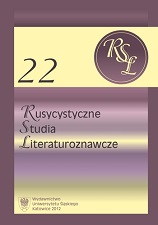Między utopią, mitem a historią alternatywną. "Moskwa Kwa-Kwa" Wasilija Aksionowa
Between a utopia, myth and alternative history. "Moskawa Kwa-Kwa" by Wassilij Aksionow
Author(s): Andrzej PolakSubject(s): Language and Literature Studies
Published by: Wydawnictwo Uniwersytetu Śląskiego
Keywords: anti-utopia; myth; alternative history; Aksionow; Stalin
Summary/Abstract: The article is devoted to one of the last novels by W. Aksionow. The author of the article, pointing to the senses included in the work, makes use of three thematic categories Moskwa Kwa-Kwa was based on, namely the myth of Theseus and the Minotaur, a utopian project of Plato’s nation, and an alternative history. The action takes place in the capital of the Soviet Union in last years of Stalin’s ruling aiming at the creation of a new religion (New Phase). In Moscow, in the meantime, a decisive conflict between Stalin’s advocates and his enemy, Josip Broz Tito, a Yugoslavian ruler appears. The picture of Kiriłł Smielczakow, the main character of the novel, refers to the fate of Theseus, one of the key figures in the Ancient mythology in many respects. Kiriłł fights with two Minotaurs: Stalin and Tito at the same time. The structure of the Soviet nation and society presented in the article seems to owe Plato’s utopian vision.
Journal: Rusycystyczne Studia Literaturoznawcze
- Issue Year: 2012
- Issue No: 22
- Page Range: 129-147
- Page Count: 19
- Language: Polish

